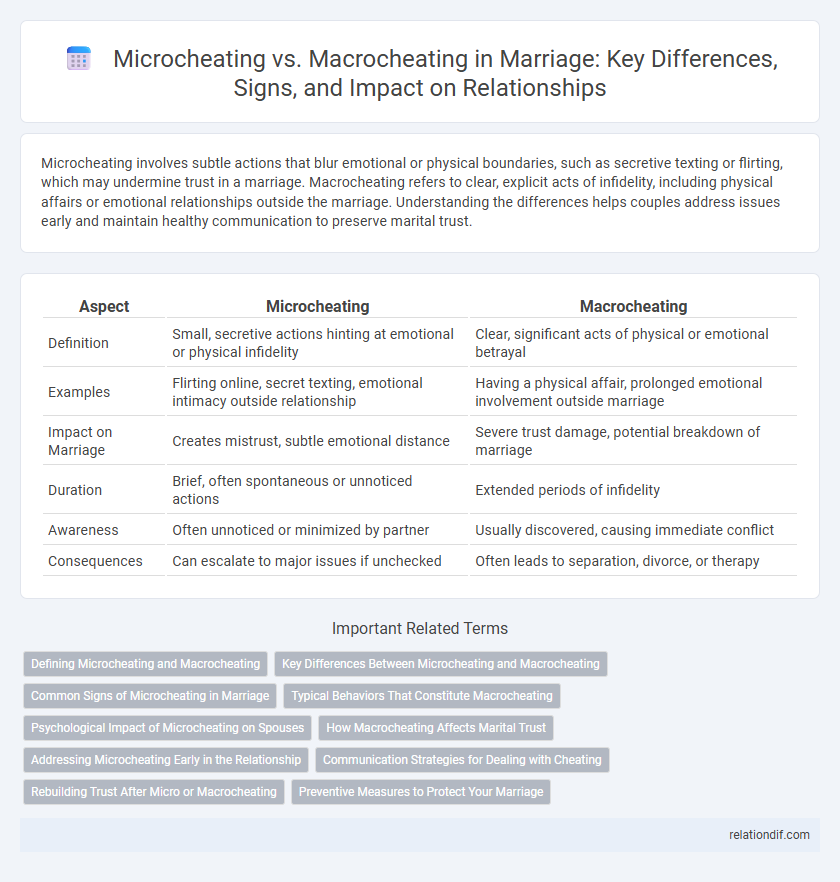Microcheating involves subtle actions that blur emotional or physical boundaries, such as secretive texting or flirting, which may undermine trust in a marriage. Macrocheating refers to clear, explicit acts of infidelity, including physical affairs or emotional relationships outside the marriage. Understanding the differences helps couples address issues early and maintain healthy communication to preserve marital trust.
Table of Comparison
| Aspect | Microcheating | Macrocheating |
|---|---|---|
| Definition | Small, secretive actions hinting at emotional or physical infidelity | Clear, significant acts of physical or emotional betrayal |
| Examples | Flirting online, secret texting, emotional intimacy outside relationship | Having a physical affair, prolonged emotional involvement outside marriage |
| Impact on Marriage | Creates mistrust, subtle emotional distance | Severe trust damage, potential breakdown of marriage |
| Duration | Brief, often spontaneous or unnoticed actions | Extended periods of infidelity |
| Awareness | Often unnoticed or minimized by partner | Usually discovered, causing immediate conflict |
| Consequences | Can escalate to major issues if unchecked | Often leads to separation, divorce, or therapy |
Defining Microcheating and Macrocheating
Microcheating refers to subtle actions or behaviors that indicate emotional or physical intimacy with someone outside a committed relationship, often without explicit sexual contact, such as secretive texting or flirtatious interactions. Macrocheating involves overt acts of infidelity, including physical sexual encounters or emotional affairs that breach the primary commitment. Both microcheating and macrocheating can significantly impact trust and relationship dynamics, highlighting different levels of boundary violations.
Key Differences Between Microcheating and Macrocheating
Microcheating involves subtle actions such as secretive texting or emotional intimacy outside the relationship, whereas macrocheating includes overt physical or emotional infidelity like affairs or sexual encounters. The key difference lies in the degree of betrayal and intent, with microcheating often perceived as boundary-pushing behaviors while macrocheating constitutes clear breaches of trust. Both can significantly impact marital stability but require different approaches for resolution and healing.
Common Signs of Microcheating in Marriage
Common signs of microcheating in marriage include frequent flirty texting with someone outside the relationship, hiding phone screens or conversations, and consistently seeking emotional validation from individuals other than the spouse. Other indicators are secretive social media interactions, such as liking or commenting on posts in an intimate manner, and prioritizing non-spousal communication over shared relationship time. Recognizing these subtle actions early can help address trust issues before they escalate into more significant breaches like macrocheating.
Typical Behaviors That Constitute Macrocheating
Typical behaviors that constitute macrocheating include engaging in physical intimacy with someone outside the marriage, such as kissing, sexual intercourse, or ongoing romantic relationships. These actions often involve a clear breach of trust and emotional betrayal, significantly impacting marital stability. Macrocheating is distinguished from microcheating by its overt nature and the explicit violation of agreed-upon boundaries within the relationship.
Psychological Impact of Microcheating on Spouses
Microcheating can erode trust and create emotional insecurity in marital relationships, often leading to increased anxiety and suspicion among spouses. These subtle breaches of fidelity, such as secretive texting or flirtatious interactions, may not be overt but still generate significant psychological distress and feelings of betrayal. Over time, the accumulation of microcheating behaviors can undermine the foundation of emotional intimacy and contribute to long-term relational dissatisfaction.
How Macrocheating Affects Marital Trust
Macrocheating severely damages marital trust by breaching fundamental emotional and physical boundaries, leading to feelings of betrayal and insecurity. This type of infidelity often results in a breakdown of communication and intimacy, making reconciliation challenging. Couples experiencing macrocheating frequently require professional counseling to rebuild trust and restore the marriage's foundation.
Addressing Microcheating Early in the Relationship
Addressing microcheating early in a marriage is crucial to maintaining trust and emotional intimacy between partners. Recognizing behaviors such as secret texting, flirtatious online interactions, or subtle emotional connections outside the relationship helps prevent escalation into macrocheating, which involves physical or emotional infidelity. Open communication and setting clear boundaries about acceptable interactions can strengthen the foundation of the relationship and reduce the risk of betrayal.
Communication Strategies for Dealing with Cheating
Effective communication strategies for addressing microcheating and macrocheating emphasize transparency, active listening, and emotional validation to rebuild trust. Couples should establish clear boundaries and openly discuss feelings to prevent misunderstandings and foster emotional security. Consistent use of non-defensive language and scheduled check-ins can support ongoing dialogue and conflict resolution in the healing process.
Rebuilding Trust After Micro or Macrocheating
Rebuilding trust after microcheating or macrocheating requires consistent, transparent communication and a commitment to accountability from both partners. Couples therapy often proves effective in addressing the underlying issues, promoting emotional healing, and establishing new boundaries. Trust restoration hinges on demonstrating reliability over time and fostering an environment of empathy and understanding.
Preventive Measures to Protect Your Marriage
Establishing clear boundaries and open communication with partners about acceptable interactions helps prevent both microcheating and macrocheating behaviors. Regularly scheduling quality time together and fostering emotional intimacy reinforce trust and reduce opportunities for infidelity. Utilizing premarital counseling or couples therapy can also identify vulnerabilities early and strengthen relationship resilience.
Microcheating vs Macrocheating Infographic

 relationdif.com
relationdif.com